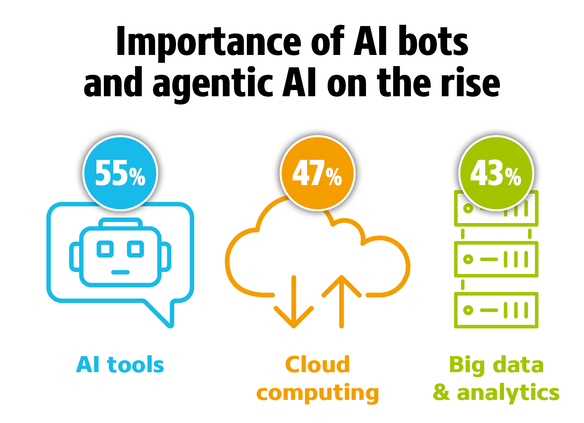Through software robotics and artificial intelligence, automation harbors unimaginable potential – and opens up entirely new avenues for companies to make their processes more efficient, more intelligent and future-ready. The Automation 2025 study from COMPUTERWOCHE Research Services, conducted in partnership with Lufthansa Industry Solutions, outlines the current degree of automation in German companies, the expectations of automation and the benefits it delivers in practice.
Automation 2025 study: importance identified, implementation leaves room for improvement
Gulf between wishes and reality
Automation is a key issue for most companies. In fact, 79% of companies describe automation as a high or very high priority – a figure which rises to 86% among medium and large enterprises. Yet, despite this high importance, satisfaction with automation lags behind considerably. Only 62% of companies are satisfied with their current level of automation. It is striking that, in general, managers and CIOs are far more satisfied with their company’s current level of automation than employees in IT and specialist departments.
Room for improvement in customer service
IT departments are currently the most likely to have deployed automation. Over 44% of respondents indicated that IT processes have already been automated, or that specific plans for automation projects have been drawn up. Management, finance and controlling are the fields next most likely to have adopted automation at roughly 35% each. The level of automation in customer service is far lower, with just 25% of respondents confirming that their company uses automated processes in this area. Significant potential remains untapped, especially in relation to customer service – and could improve process efficiency, enhance customer service quality and, ultimately, boost customer satisfaction.
- Which technologies companies are using to implement automation
- What targets companies can achieve through automation
- Which processes are the simplest to automate
- Where the most significant challenges to automation lie
- How satisfied companies are with their automation projects

- Increased automation with the help of AI
More than half of companies rely on AI tools for automation – with particularly common solutions including personal AI assistants, chatbots, voicebots and AI agents. Alongside AI, companies often also deploy technologies such as cloud computing, big data and analytics.
- High satisfaction with results of automation projects
Over two-thirds of respondents are satisfied or very satisfied with the outcome of automation projects at their company to date. Once again, the satisfaction reported by respondents in leadership positions and IT management (83%) is far higher than by employees in IT departments (62%) and other specialist departments (51%).
- Automation of repetitive tasks and end-to-end automation dominate
At present, companies that automate processes primarily concentrate on repetitive tasks that require human decisions (90%) and on end-to-end automation (86%). The study found that around 35% to 50% of automation projects are still in the planning phase.

